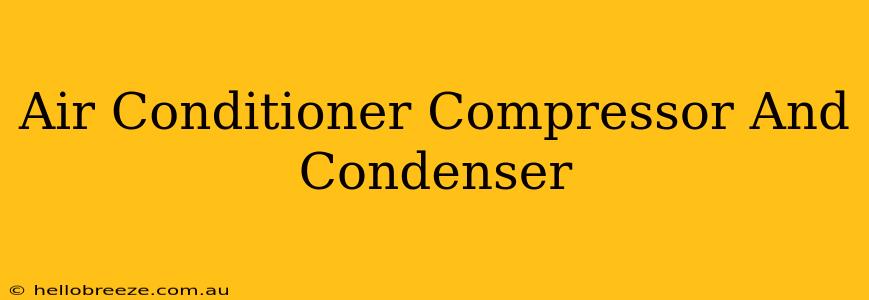Understanding your air conditioner's components is crucial for maintaining a cool and comfortable home. This guide delves into two vital parts: the compressor and the condenser, explaining their functions, how they work together, and common problems you might encounter.
The Air Conditioner Compressor: The Heart of the System
The compressor is arguably the most important part of your AC unit. Think of it as the heart, pumping refrigerant throughout the system. Its primary function is to compress the refrigerant, increasing its pressure and temperature. This high-pressure, high-temperature refrigerant is then sent to the condenser.
How the Compressor Works: A Step-by-Step Look
- Low-Pressure Refrigerant Intake: The compressor draws in low-pressure, low-temperature refrigerant vapor from the evaporator coil (located inside your home).
- Compression: The compressor's powerful motor compresses this vapor, significantly raising its pressure and temperature.
- High-Pressure Refrigerant Discharge: The now high-pressure, high-temperature refrigerant gas is discharged to the condenser.
Common Compressor Problems: A failing compressor can manifest in various ways, including:
- No Cooling: The most obvious sign is a complete lack of cool air.
- Unusual Noises: Grinding, clicking, or humming sounds are indicators of potential issues.
- Overheating: The compressor may overheat and shut down due to malfunctions.
- Refrigerant Leaks: A faulty compressor seal can lead to refrigerant leaks, further hindering cooling.
Important Note: Compressor repair or replacement is best left to qualified HVAC technicians. Attempting DIY repairs can be dangerous and may void warranties.
The Condenser: Releasing Heat to the Outside
The condenser is the outdoor unit of your air conditioner. Its job is to release the heat absorbed from your home's interior back into the outside environment. This is achieved through a process of heat exchange.
How the Condenser Works: The Cooling Process
- High-Pressure Refrigerant Arrival: The hot, high-pressure refrigerant from the compressor enters the condenser coils.
- Heat Dissipation: The refrigerant flows through the condenser coils, which have a large surface area designed for efficient heat transfer. A fan blows air across these coils, facilitating the dissipation of heat.
- Refrigerant Condensation: As the refrigerant releases heat, it changes from a hot, high-pressure gas to a cooler, high-pressure liquid.
- Refrigerant Flow: The now liquid refrigerant continues its journey back to the evaporator coil, completing the cycle.
Common Condenser Problems: Like the compressor, the condenser can experience various issues:
- Frozen Coils: This often indicates a problem with airflow, refrigerant levels, or a malfunctioning fan motor.
- Dirty Coils: Accumulated dirt and debris restrict airflow, reducing cooling efficiency. Regular cleaning is crucial.
- Fan Motor Issues: A faulty fan motor prevents efficient heat dissipation, hindering cooling performance.
- Refrigerant Leaks: Leaks in the condenser coils can result in reduced cooling capacity and potential damage to the system.
Compressor and Condenser: A Working Partnership
The compressor and condenser work together seamlessly to create a cooling effect. The compressor pressurizes the refrigerant, while the condenser releases the heat it carries. A problem with either component significantly impacts the overall efficiency and performance of your air conditioning system. Regular maintenance, including cleaning and professional inspections, is key to extending the lifespan of both these crucial components.
Maintaining Your AC System for Optimal Performance
Regular maintenance is crucial for extending the life and ensuring the optimal performance of your air conditioning system. This includes:
- Regular cleaning: Dust and debris can accumulate on the condenser coils, reducing efficiency. Clean them regularly, or consider hiring a professional for a thorough cleaning.
- Professional inspections: Scheduling annual inspections by a qualified HVAC technician can help identify potential problems early on, before they become major repairs.
- Air filter changes: Changing your air filter regularly helps prevent dust and debris from entering the system and impacting performance.
By understanding the roles of the compressor and condenser, and by committing to regular maintenance, you can ensure your air conditioner provides reliable cooling for years to come, keeping your home comfortably cool during hot weather.

